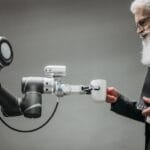Contents
Introduction
AI Business In 2025, agents are transforming businesses worldwide. Companies that adopt driven automation are witnessing enhanced efficiency, reduced operational costs, and improved decision-making. This blog explores how agents are revolutionizing business operations and why you should consider integrating them into your company.
What Are AI Agents?
agents are intelligent programs capable of making autonomous decisions, analyzing data, and executing tasks without human intervention. They use machine learning, natural language processing (NLP), and predictive analytics to optimize workflows.
Examples of Agents:
- Chatbots for customer service
- -driven marketing assistants for personalized campaigns
- Process automation bots for handling repetitive tasks
- -powered analytics tools for business insights
How AI Agents Are Changing Businesses
Businesses across industries, from e-commerce to finance and healthcare, are leveraging agents to drive innovation.
Key Transformations:
Automation of Repetitive Tasks – bots handle administrative work, freeing up human resources.
Improved Customer Experience – chatbots provide instant support, improving engagement.
Data-Driven Decisions – analyzes large datasets to provide actionable insights.
Enhanced Security – -powered fraud detection helps protect sensitive business data.
Benefits of AI Agents in 2025
1. Increased Productivity
agents reduce manual workload, allowing employees to focus on strategic tasks.
2. Cost Savings
Companies save money by automating customer service, HR, and IT operations.
3. Scalability
solutions help businesses scale without increasing overhead costs.
4. Improved Accuracy
reduces human errors in data entry, analysis, and financial transactions.
Real-World Examples Implementation
1. Amazon’s Logistics
Amazon uses to optimize its supply chain, predicting demand and managing inventory.
2. Google’s Search Algorithms
Google’s constantly evolves to enhance search results, improving user experience.
3. Banking Sector
Banks like JPMorgan Chase use for fraud detection and automated customer support.
👉 Learn more about in business here
Challenges and Considerations
While AI offers numerous benefits, businesses must consider ethical implications, data privacy, and proper employee training. Successful implementation requires a clear, well-defined strategy and continuous monitoring to ensure compliance, efficiency, and trust. Balancing innovation with responsibility is essential to fully leverage’s potential while minimizing potential risks.
4o
Future of AI in Business
By 2030, agents will become even more sophisticated, integrating with IoT, blockchain, and quantum computing. Businesses that adapt early will gain a competitive edge.
Conclusion
agents are reshaping business landscapes in 2025. By integrating, companies can automate processes, reduce costs, and improve decision-making. Stay ahead of the competition by embracing solutions today!
In 2025, agents are revolutionizing the way businesses operate, creating smarter, more agile, and cost-effective solutions across industries. From customer support to complex data analysis, agents are streamlining workflows and enabling organizations to focus on innovation rather than manual operations. Companies that integrate into their processes are gaining a significant competitive edge by enhancing efficiency, reducing operational costs, and improving overall decision-making.
These intelligent agents use machine learning, natural language processing, and automation to perform tasks that traditionally required human effort. For example, chatbots now handle customer service inquiries around the clock, while predictive analytics tools assist executives in making informed strategic decisions based on real-time data. In fields like marketing, is helping personalize content, optimize ad spending, and even predict customer behavior, allowing businesses to deliver more targeted and effective campaigns.
Moreover, agents are enabling businesses to scale faster. Startups and small enterprises, once constrained by limited human resources, can now leverage automation to compete with larger corporations. Routine tasks such as scheduling, reporting, and lead qualification are managed by systems, freeing up teams to focus on higher-level strategic work.
In 2025, not adopting is no longer an option—it’s a risk. As digital transformation continues to accelerate, businesses that fail to implement -driven solutions may struggle to keep up. Embracing agents is not just about staying current; it’s about future-proofing your business in an increasingly automated world.





